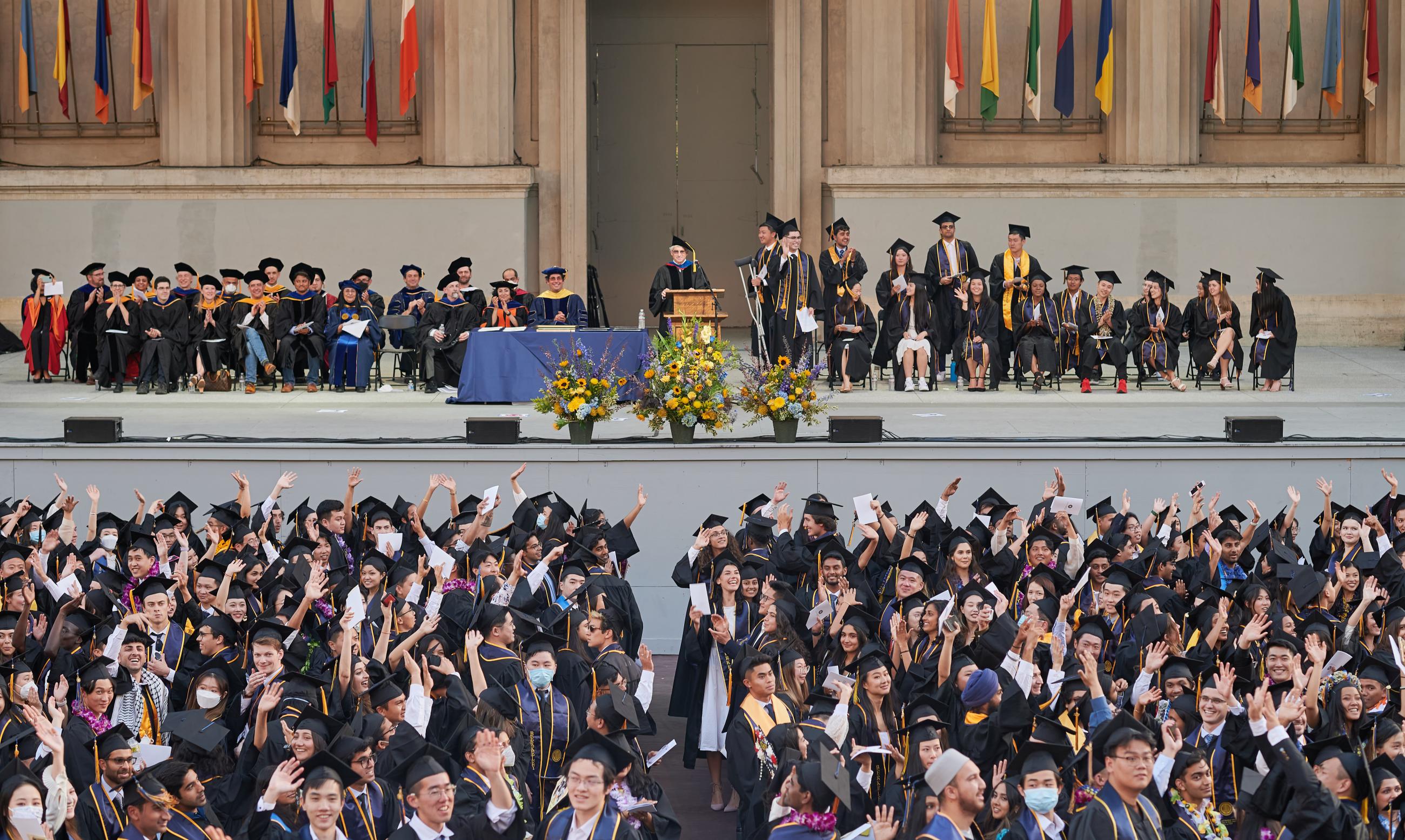
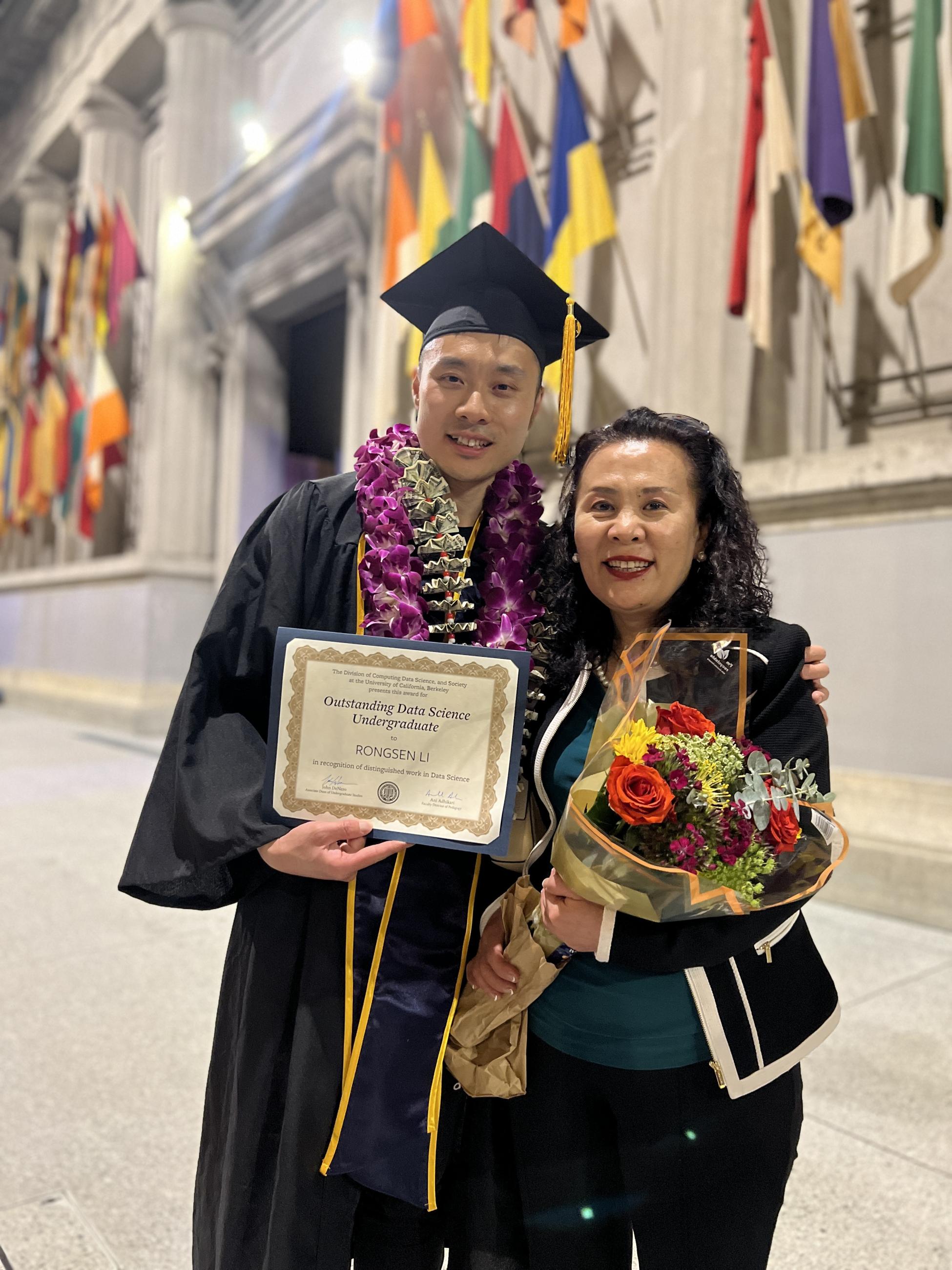
Eight years ago, Rongsen Li was working at a Chinese restaurant near UCLA. “I was a new immigrant in the U.S., and I could barely speak a sentence in English,” said Li, a UC Berkeley graduate who received his Data Science bachelor’s degree during the program’s May 18 commencement. “I would see the UCLA students and think, ‘If I had a second chance, I wouldn’t have dropped out of high school. I would have studied harder and had the chance to go to a university.’”
Li worked full-time while taking community college courses for five years before transferring to Berkeley. “I doubted myself a thousand times,” said Li, who received an Outstanding Data Science Undergraduate award at the ceremony.
The last time Berkeley data science students lined up to receive diplomas at an in-person commencement, it was the very first time any students had graduated with that major from the university. At the 2019 ceremony in Wheeler Hall, 82 students graduated in data science. At this week’s commencement, nearly 500 graduates walked across the stage at the Hearst Greek Theatre to receive their Data Science bachelor’s degree, with approximately 700 expected total graduates this year.
Jennifer Chayes, associate provost for the Division of Computing, Data Science, and Society (CDSS), commended the graduates for their success “not only because you’ve completed a demanding curriculum, but also because you have done so during a global pandemic.”
Graduating student Geline Mascardo said the significance of an in-person ceremony was tremendous. “Because a lot of my college experience was online, it makes me very grateful. It makes me emotional that I can savor this moment with family and friends,” she said. “It's beautiful to be with a crowd of people celebrating someone they love.”
Li, Mascardo and their fellow graduates persevered through difficult classes and sometimes less than ideal online learning environments. “I shared a two-bedroom apartment with five other students,” said Li. “I didn’t even have a table to work at, just a bed.”
“This is the first graduation ceremony I have ever attended in my entire life,” added Li, whose mother was present for the commencement. “She’s even more excited than I am!”
The growth of data science at Berkeley
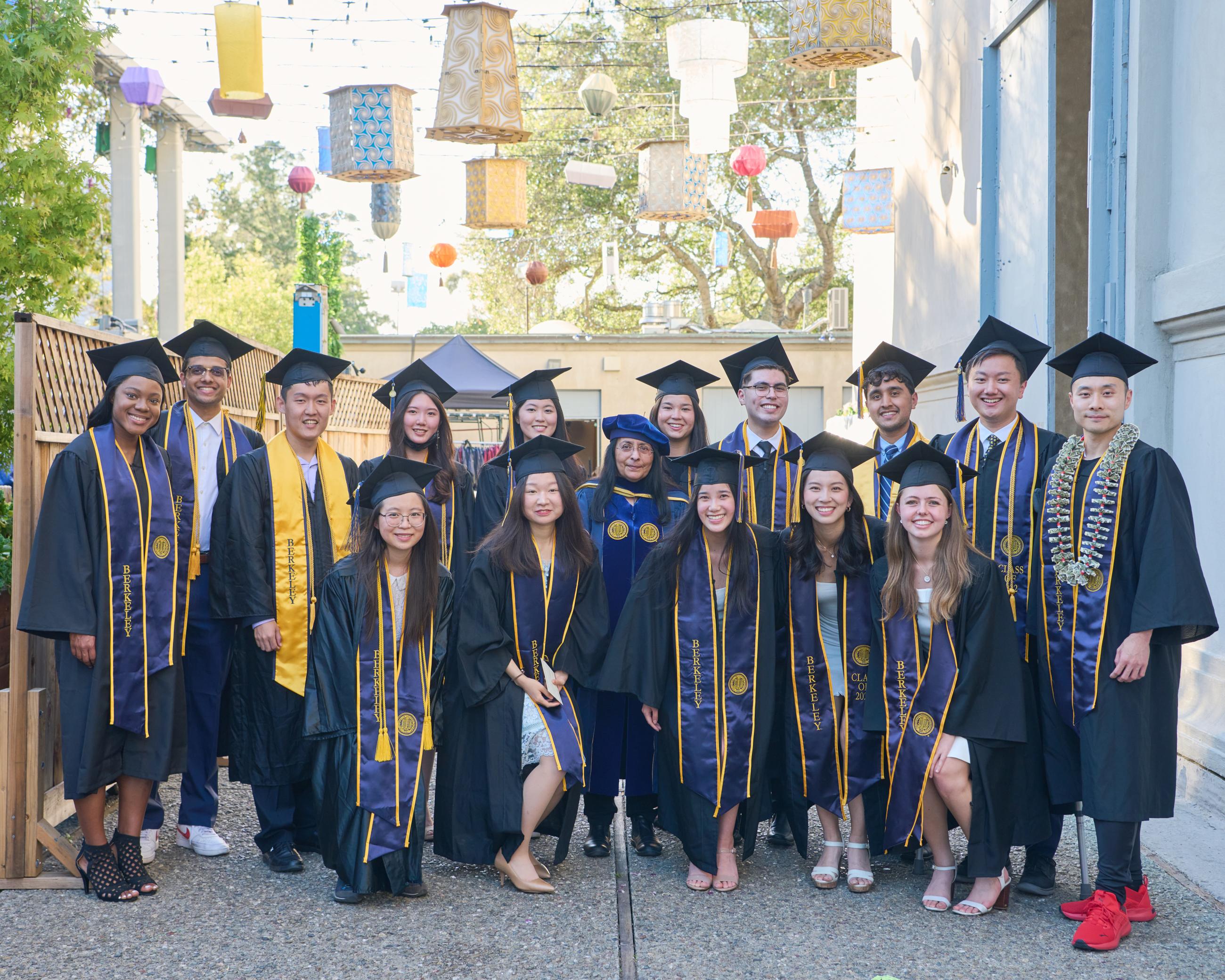
Xinran Liang, recipient of the Departmental Citation and an Outstanding Undergraduate Student Instructor award, said she feels fortunate that her time at Berkeley coincided with the growth of the data science major. Liang will enter the computer science program at Princeton this fall as a Ph.D. student. While her family couldn’t travel from China due to Covid-19 restrictions, Liang said it was meaningful to celebrate with fellow students. “Student support in the data science community at Berkeley is very powerful,” Liang said. “The faculty and other students try to help everyone succeed regardless of their background.”
“I’m a Latino student from a first-generation, low-income background,” said Carlos Ortiz during his student remarks at the event. “I’m honored and very proud to speak here,” he added. Ortiz congratulated his classmates on their successful journey together, emphasizing that the student-led nature of Berkeley’s data science program distinguishes it from data science studies anywhere else.
Ortiz also noted the respect that faculty show students, exemplified by how Ani Adhikari, faculty director of pedagogy for Data Science Undergraduate Studies, encouraged him to take a lead role in Data Scholars. Ortiz said the opportunity to teach and mentor underrepresented students in data science energized him and enabled him to realize the representation he had always hoped for as a student.
“It signifies that all of that hard work paid off,” said Jenea Spinks of her recognition as an Outstanding Data Science Undergraduate. A student-athlete who transferred to Berkeley in her second year of undergraduate studies, Spinks acknowledged the transition was challenging, as was negotiating class assignments with track practices and meets. The support of peers and mentors such as Adhikari was crucial to her success, she said. Spinks shared advice for current and future Berkeley data science students: “Don't be afraid of the faculty. They're there to help you, and they go above and beyond.”
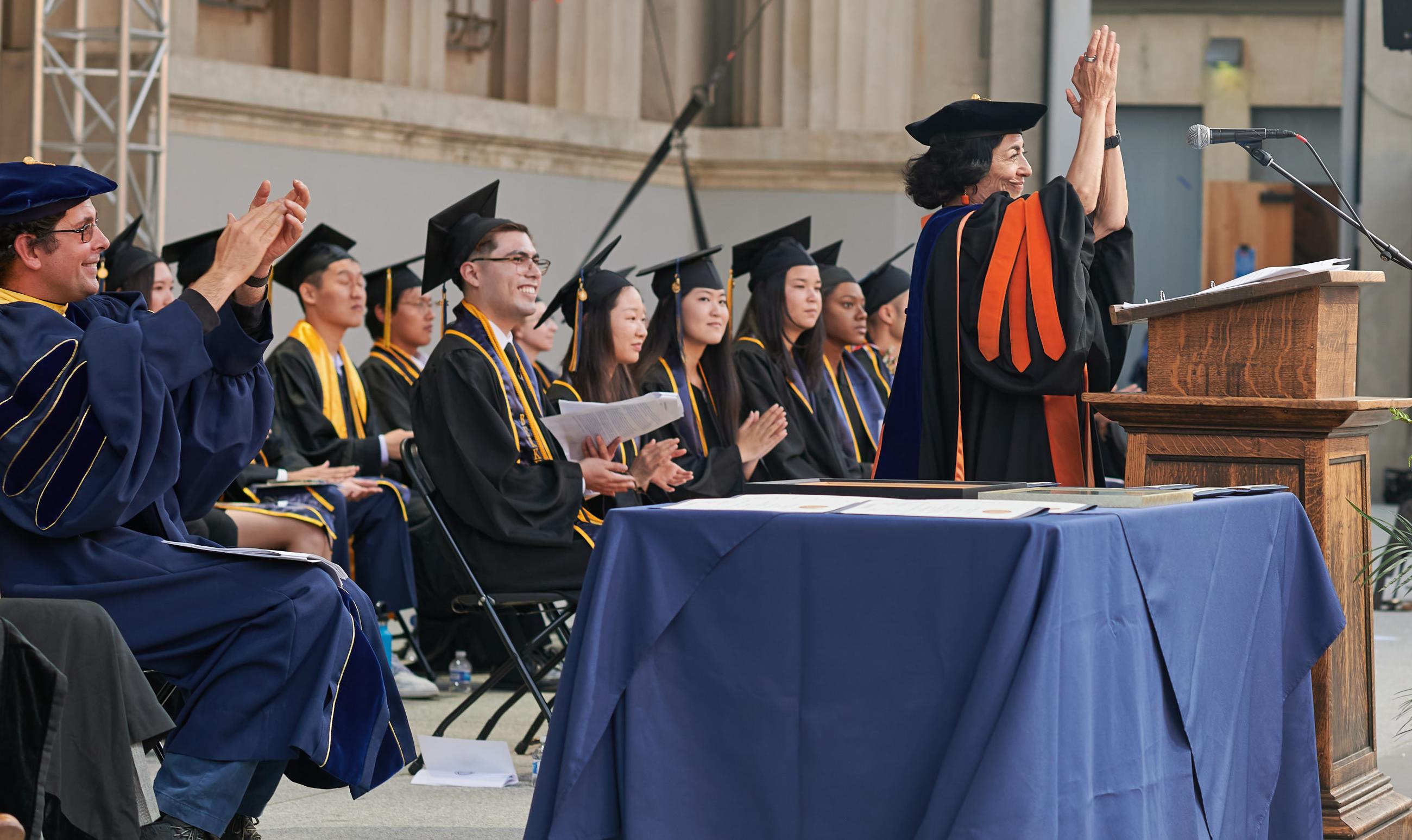
In her congratulatory remarks, Chayes encouraged the graduates to lean on one another in the future “as an abundant source of friendship, support and career advice throughout your life.” Indeed, many graduates identified mutual support among students as a hallmark of the data science community at Berkeley.
In his remarks, Ortiz attributed the program’s success to peers empowering peers. “I’ve never met a data science student who isn’t invested in the program,” he said.
Ortiz hopes to continue teaching and mentoring even though he will soon start a job at Snapchat as an engineering data scientist. He said he has already spoken to Eric Van Dusen, outreach and technology lead for the Data Science Undergraduate Studies program, about teaching data science at a community college.
History as “an incredibly efficient form of data compression”
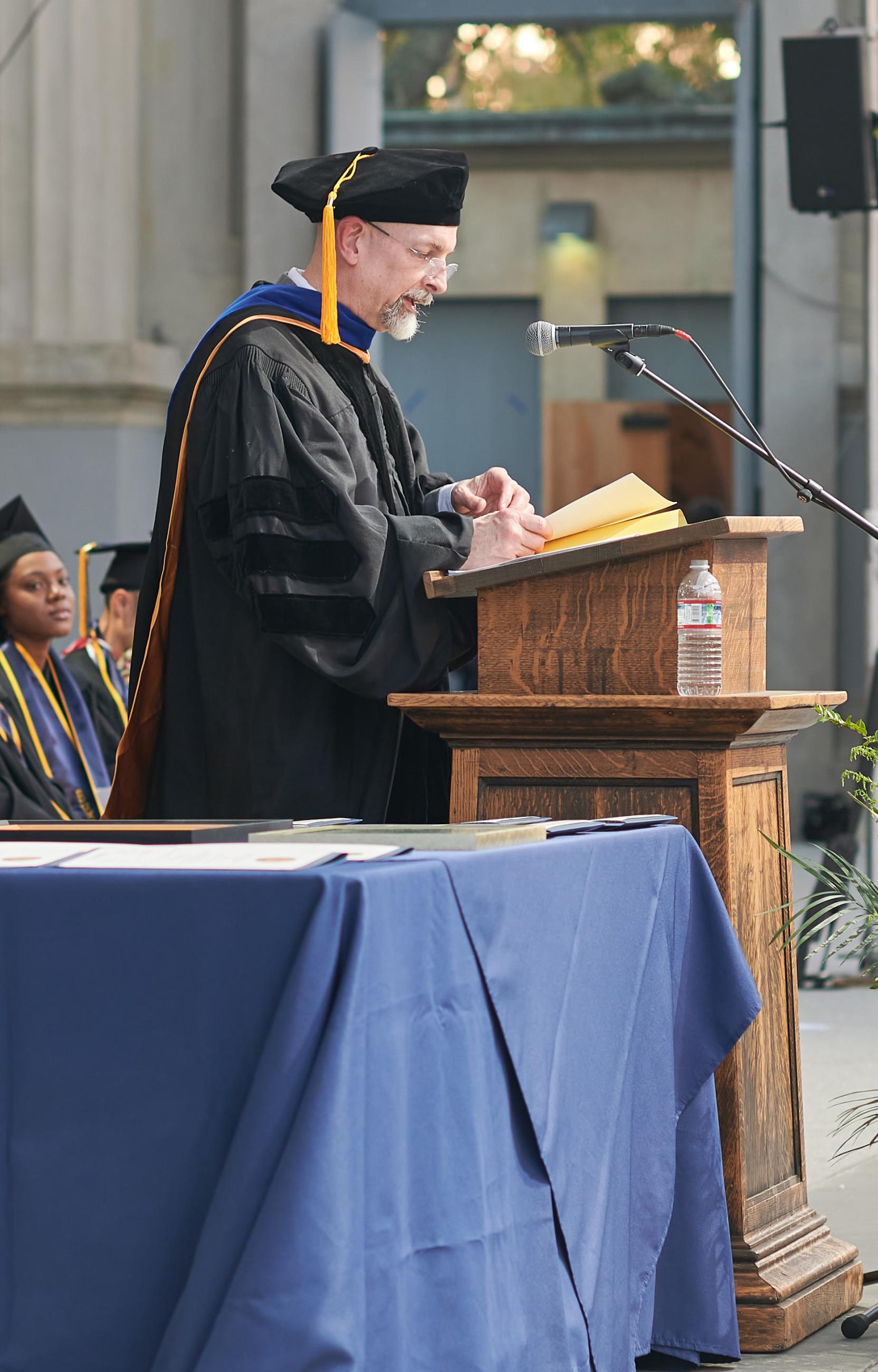
The commencement’s guest speaker was Neal Stephenson, acclaimed author of speculative fiction, adviser to Jeff Bezos’ Blue Origin and member of the new CDSS advisory board. In his remarks, Stephenson reflected on his conversations with the late Walter Wriston, a Citibank executive who personified “the establishment.” Stephenson shared a historical perspective and what it means to challenge the status quo.
“Just during the time you’ve been going through higher education, you’ve seen an attempted coup run out of the White House, with co-conspirators in the Supreme Court and Congress, aimed at toppling our 230-year-old constitution,” Stephenson said as he enumerated daunting struggles the graduates had already faced. “A global pandemic that in two years killed twice as many Americans as the Second World War killed in four,” he continued.
Stephenson observed that people are good at direct action “when they know for real what’s going on.” He urged the graduates to stay connected to objective reality, a challenge when regularly inundated with misinformation. To do so, he advised them to pick up rather than put down their books and read some historical narrative. Stephenson described history as “an incredibly efficient form of data compression” that enables you to recognize redundant material and replace it with a “smaller token.” You can then “mentally substitute for vast redundant chunks of contingent information that come flooding in every day on the news,” he said.
Stephenson reminded graduates that someday they would be the ones who lived through this time, with another generation holding them accountable and regarding them as the establishment. To that sobering image, he added, “Congratulations, and good luck.”
Facing the many crises that Stephenson described is no small feat, a reality that Chayes also acknowledged in her remarks. “We need brilliant and fearless data scientists to help address pressing societal challenges, including misinformation and bias, climate change and sustainability, biomedicine and health, and social justice,” said Chayes.
“Why aren’t there any ‘go’ signs?”
Before Professor Emeritus David Culler provided remarks at commencement, he was presented with the Berkeley Citation award by John DeNero, associate dean for undergraduate studies at CDSS. Culler had previously been named a recipient of this award – the highest honor bestowed by the university – but was unable to receive it at an in-person ceremony due to the Covid-19 pandemic.
The former professor of electrical engineering and computer sciences and current distinguished engineer at Google began by humbly referring to himself as “the beta version” of Chayes, describing UC Berkeley as the most important institution in his life. He then listed his numerous family connections to the University of California and said that, for this reason, he had chosen to root his remarks in family.
Culler’s father was a pioneer of computer science at UC Santa Barbara, and he saw the internet go from four nodes to 4 billion in his lifetime. His father taught him that “the role of computing wasn’t just to do the grunt work of running the numbers, but to serve human creativity, to give us ways to think about solving new problems,” Culler said.
“And I think this program has embodied some of that in you, so I hope you realize you, too, are pioneers, creative trailblazers,” he told the graduates.
Culler also shared a memory about his son learning to read: As Culler drove down a street, his son pointed out all the signs and finally asked, “Dad, why aren’t there any ‘go’ signs?” Culler encouraged the graduates to likewise explore “the intellectual negative space,” questioning not only what is but also what could be.
Finally, Culler told a “creation myth” about Data 8, the entry point for many Berkeley students to the world of data science. Culler explained how he, Adhikari, DeNero, Deb Nolan and Michael Jordan developed this foundational course, noting that the process was uncertain, with discussions that “ran around in circles.” In the beginning, he observed, “sometimes you just need to get started.” He encouraged the graduates to “take that first leap.”
Towards the end of the ceremony, the exuberant cheers of family and friends made a lighthearted counterpoint at the outdoor amphitheater as the graduates shook hands with DeNero and received their scrolls.
For graduating student Liang, commencement offered one final opportunity to look back before taking her next leap. “Getting the diploma is the most exciting thing," she said. “The past four years have been so fast. I’ve had so many wonderful experiences at Berkeley. I’m taking this moment to reflect and memorize this place.”
